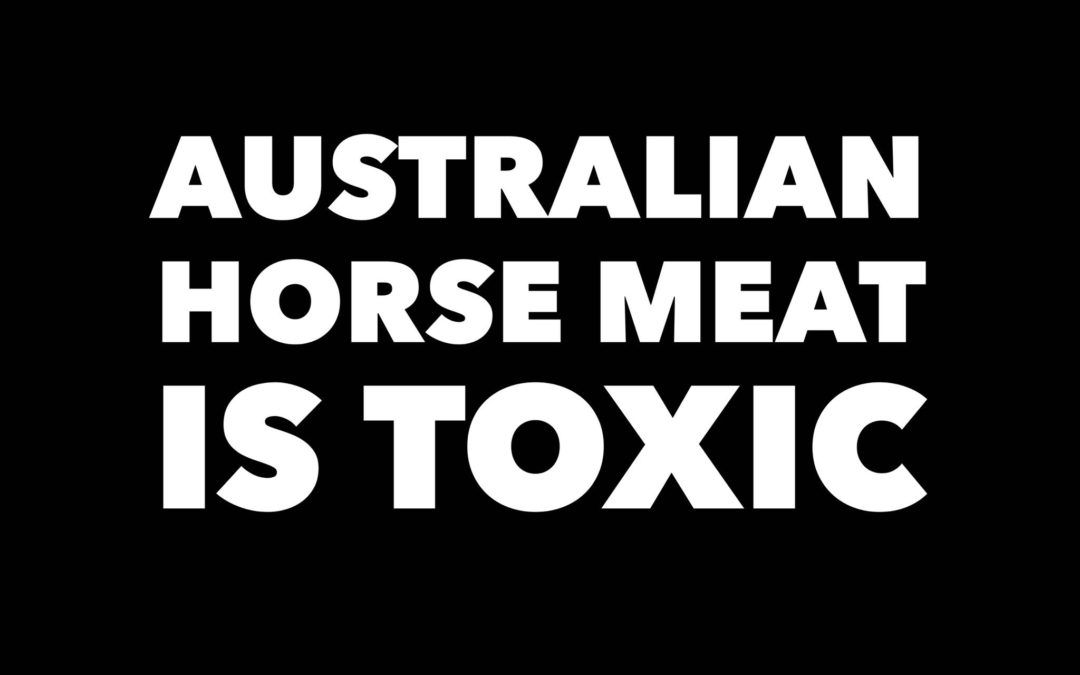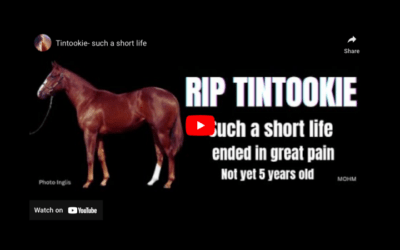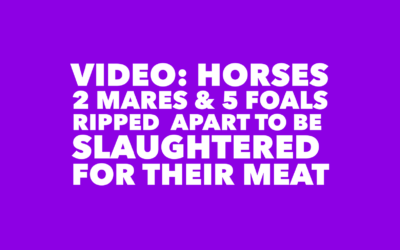
European Union Licence and food safety
The European Union has strict standards for animal welfare and food safety and does regular audits.
Horse Identification
When horses are purchased for human consumption by a dogger, they need to be identified by a tag around their neck with a number that corresponds to a Horse Vendor Declaration (HVD).
There is a problem with this when large numbers of horses are purchased at an auction.
At the end of the auction, the horses are all run onto a truck and driven away to the assembly centre of the dogger.
Unless the horses are tagged before this happens, it is unlikely that the horse can be matched to the HVD.
Horse Vendor Declarations
This is the paperwork that accompanies a horse that is going for human consumption.
Australian horses are not bred for food production.
There are over 100 treatments and drugs that specify not for use in animals for human consumption.
The Horse Vendor Declaration asks about such treatments in the past 6 months.
There are many horse auctions in Australia.
Some hand out HVDs to meat buyers and others do not.
Somehow those horses purchased at auctions without authentic HVDs still arrive at Meramist with a HVD.
There are eye witness accounts of auction staff filling in the HVDs for the vendor to sign.
The vendor has no idea that the HVD makes their horse eligible for human consumption slaughter.
The Meat Notice explicitly states that the vendor has to fill in the form.
MN15-03 – Revised horse traceability verification requirements for access to the European Union
Food safety
Australia has a National Livestock Identification Scheme that ensures that all livestock produced for food can be identified and traced.
Australian horses are not bred for food and so they are not part of this scheme.
Horse Vendor Declarations and residue testing are supposed to guarantee that horse meat is safe to eat.
This system is completely flawed.
Verification of Horse Vendor Declarations
This means that the person that signed the original HVD is actually the original owner of the horse and can declare that the horse is free from dangerous drug residues in the previous 6 months. The Horse Vendor Declarations are verified by Meramist and the On Plant Vet who is employed by the Department of Agriculture. Each horse slaughter day, a Meramist worker verifies one original HVD by ringing the original owner who has signed the HVD. One horse ‘s paperwork is verified out of a possible 250 horses. The OPV also has to verify one HVD every 10 horse slaughter days, in other words, one horse out of a possible 2,500 horses.
Residue Testing
This is a national testing regime to ensure all food production animals are safe for people to eat.
Each horse slaughtered at Meramist attracts a levy of $5 that pays for this service.
It turns out that the testing regime tests 10 samples a year.
Yes, ONLY 10 samples out of 10,000 horses are tested for Phenylbutazone each year.
Phenylbutazone
Any horse owner will tell you that Phenylbutazone or Bute is an everyday go-to medication. It’s so common in fact, that it’s like paracetamol for humans. It is used as an anti-inflammatory and painkiller.
It is, however dangerous for humans. It has the potential for severe bone marrow toxicity, which results in dangerously low white blood cell counts. Other side effects include :
-
ulcerations
-
abdominal burning
-
pain
-
cramping
-
nausea
-
gastritis
-
serious gastrointestinal bleeding, and
-
liver toxicity.
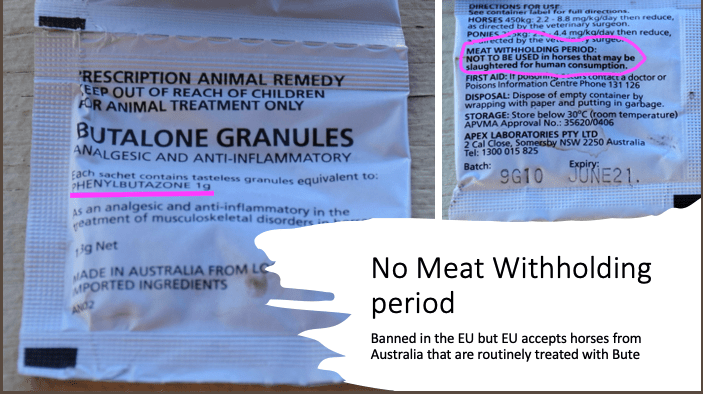
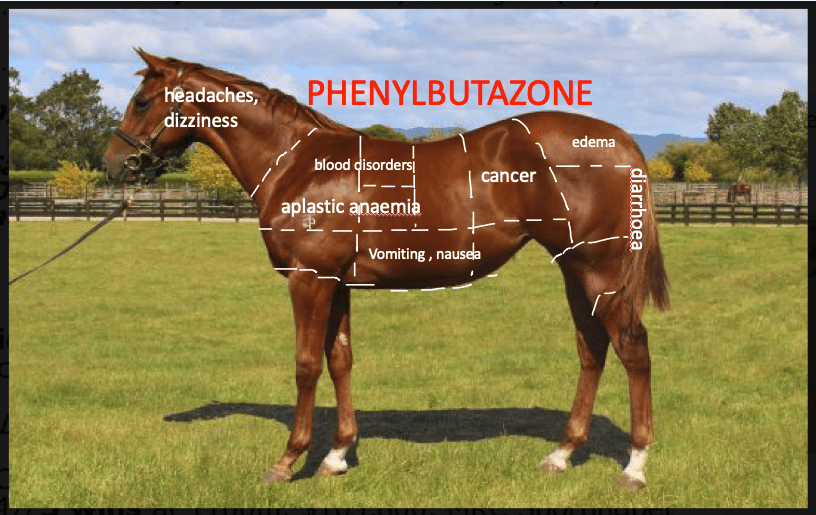
Do you still think horse meat from Australia is safe to eat?
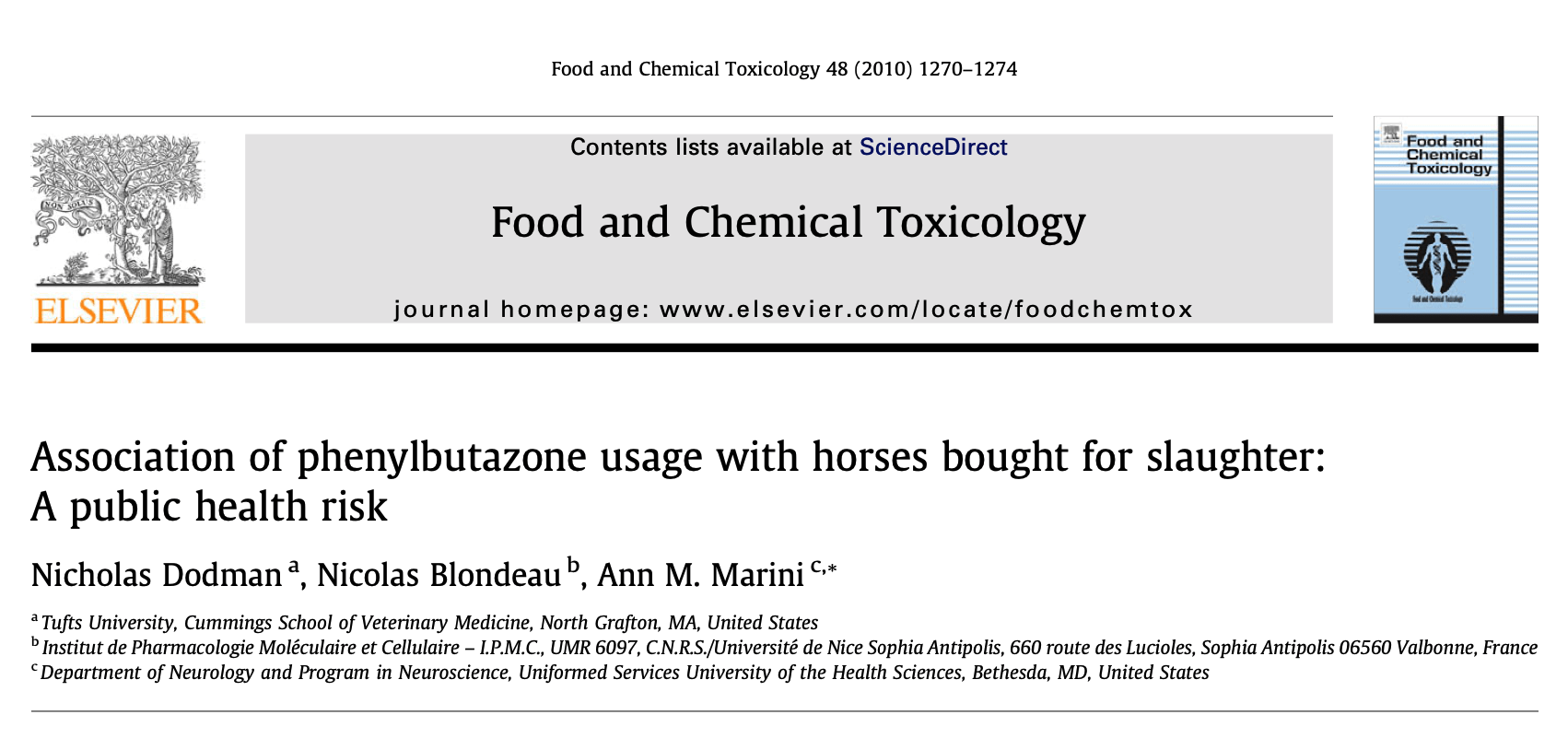
Phenylbutazone a public health risk.
“Phenylbutazone (PBZ) is the most commonly used non-steroidal anti-inflammatory drug (NSAID) in equine practice.
Thoroughbred (TB) race horses like other horse breeds are slaughtered for human consumption.
Phenylbutazone is banned for use in any animal intended for human consumption because it causes serious and lethal idiosyncratic adverse effects in humans.
The number of horses that have received phenylbutazone prior to being sent to slaughter for human consumption is unknown but its presence in some is highly likely.”
“Phenylbutazone (PBZ) was marketed in the United States for the treatment of rheumatoid arthritis and gout in 1952. Serious and often fatal adverse effects such as aplastic anemia and agranulocytosis appeared in the literature within three years of its use.”
“The serious adverse effects of PBZ culminated in its unavailability for human use in the United States.”
“Because of the bone marrow toxicity caused by PBZ in humans, the Food and Drug Administration (FDA) has set no safe levels of PBZ in animals intended for food and bans the administration of this drug in any horse sent to slaughter for human consumption.”

No horse in the EU can be slaughtered for human consumption if it has ever been given Bute because it stays in the tissues for a lifetime.
However, Australian horses who are routinely given Bute, are being slaughtered for Europeans to eat.
Does residue testing exclude tainted meat?
No, and it will soon become clear why. Firstly, we know that the majority of horses being slaughtered are racehorses. These horses are always being given Phenylbutazone. The Horse Vendor Declaration doesn’t prevent horses that have been treated with it in the past 6 months from being slaughtered. There are cases of false HVDs, and cases of stolen horses being slaughtered at Meramist. Doggers have even admitted that the HVDs do not match up with the horses and that horses get swapped around. There is evidence that horses are being slaughtered for European plates that have been treated with Bute in the weeks before slaughter.Why doesn’t the residue testing pick up Phenylbutazone?
Again, it turns out that the testing regime tests 10 samples a year.
Yes, only 10 samples out of 10,000 horses are tested for Phenylbutazone each year.
You can look at the data sets here.
European Commission Audit
The European Commission audits non EU countries to see that producers comply with their animal welfare and food safety standards. In 2019, Meramist was one of a number of facilities that were audited.They found the Australian system of food safety to be unreliable.

European Commission audit findings:
Unreliable HVDs (Horse Vendor Declarations), residue tests do NOT correspond with the HVD.
Horse meat from Australia is NOT safe for human consumption.
#MOHM NEEDS YOUR HELP!
We’ve been threatened by those in the horse racing industry and those who benefit from horse slaughter more times than we can count.
But we are not going away.
We are going to persist until horse slaughter no longer exists for any purpose within Australia -- and until the horse racing industry makes drastic changes.
We are going to continue our hands-on work to offer lifelong sanctuary to as many horses as possible. We generally have 20 at just one of our locations - at any given time.
We have the acreage to take on more horses as financial support allows.
TINTOOKIE (VIDEO)
THINK RACING IS GLAMOROUS? THINK AGAIN!Tinkookie died by snapping her leg at Rosehill in March 2024. She had a very short life, she wasn't 5 years old yet. Green shields are erected so the public do not see the extreme pain horses are in when they snap a leg. Horses...
FOALS RIPPED FROM MARES
5 FOALS SAVED BUT 2 MARES SLAUGHTEREDUnfortunately, heartbreaking scenes like these mares being separated from foals play out at auctions across Australia on a regular basis.Let's start with a little background of what happens in countries like Australia where it is...

